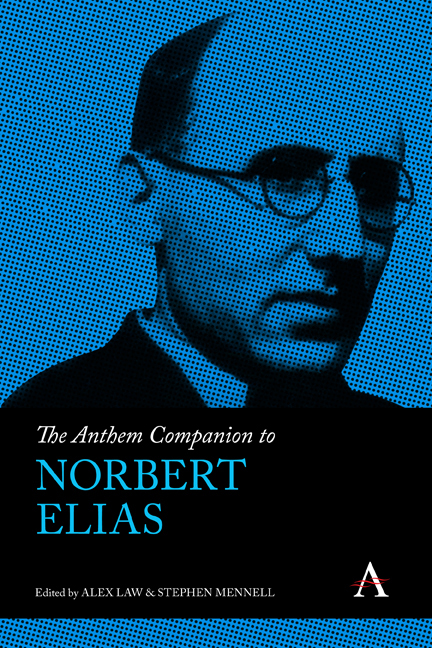Book contents
- Frontmatter
- Contents
- Notes On Contributors
- Acknowledgments
- Introduction: The Sociological Promise of Norbert Elias
- One Norbert Elias: Genesis of a Determined Thinker
- Two Knowledge, Science and Method: The Sociological Practice of Norbert Elias
- Three Norbert Elias’s Comparative Historical Sociology: Against Process Reduction
- Four Power and Process: Norbert Elias and the Paradox of Inequalities
- Five Norbert Elias and Shifting Gender Relations
- Six Travelling With Elias: Figurations and the Racialising Process in South Africa
- Seven Excitement Processes, Embodiment and Power Relations in Sport and Leisure
- Eight Warfare, Survival Units, National Habitus and Nationalism: Norbert Elias’s Contribution to Political Sociology
- Nine Elias’s Contribution to International Relations Theory: Towards a Global Sociology
- Ten Crime, Government and Civilisation: Rethinking Elias in Criminology
- Eleven Art and the Civilising Process
- Twelve From Social Mobility to Channels of Opportunity: Norbert Elias and Education
- Appendix: Published Works of Norbert Elias in English
- Index
One - Norbert Elias: Genesis of a Determined Thinker
Published online by Cambridge University Press: 28 February 2024
- Frontmatter
- Contents
- Notes On Contributors
- Acknowledgments
- Introduction: The Sociological Promise of Norbert Elias
- One Norbert Elias: Genesis of a Determined Thinker
- Two Knowledge, Science and Method: The Sociological Practice of Norbert Elias
- Three Norbert Elias’s Comparative Historical Sociology: Against Process Reduction
- Four Power and Process: Norbert Elias and the Paradox of Inequalities
- Five Norbert Elias and Shifting Gender Relations
- Six Travelling With Elias: Figurations and the Racialising Process in South Africa
- Seven Excitement Processes, Embodiment and Power Relations in Sport and Leisure
- Eight Warfare, Survival Units, National Habitus and Nationalism: Norbert Elias’s Contribution to Political Sociology
- Nine Elias’s Contribution to International Relations Theory: Towards a Global Sociology
- Ten Crime, Government and Civilisation: Rethinking Elias in Criminology
- Eleven Art and the Civilising Process
- Twelve From Social Mobility to Channels of Opportunity: Norbert Elias and Education
- Appendix: Published Works of Norbert Elias in English
- Index
Summary
The meaning a person's words and the meaning of a person's life have in common that the meaning associated with them by that person cannot be separated from that associated with them by other persons.
Norbert Elias (2010, 44)There is an intellectual tradition that downplays the importance of the biography. It recognises the biography as an accumulation of anecdotal episodes. However, from a sociological point, thinking evolves within a context. A human mind is a thinking machine that processes everything of which it becomes aware. The key to understanding the intellectual progress is not the conception of an individual that ‘thinks’, but as a junction where influences condense into new thoughts.
This distinction is particularly important when it comes to a sociologist. Scientific knowledge that explores people's coexistence cannot be obtained without observations shaped by previous experience. As a chemist works in a laboratory, the social scientist works in a society. Sociologists’ experiences as social beings are shaped by the culture in which they grow up. Over the process of becoming older, they have interacted with countless people in this society. Whenever sociologists reflect upon what they have read, they do this in the presence of past experiences with groups that they have encountered and with which they have want to relate to. All their past experiences are processed, analysed and form the background of their new ideas. So, if we speak about the sociologist Norbert Elias, we should at least have a glimpse of the people who helped shape his research questions and guided him towards new sociological thinking.
Breslau
The life of Norbert Elias began in 1897 in Germany's easternmost metropolis of Breslau. He grew up in a well-off, but not fabulously wealthy, Jewish family. Elias remained the only child of his parents, who were keen for his social advancement and thus put their son under pressure. This family's environment contained numerous academics: the young Edith Stein, philosopher and Catholic saint, was one of his childhood playmates, the philosopher Ernst Cassirer was the brother of a married uncle, the graphic artist Eugen Spiro was part of the extended kinship. So Elias grew up in an academically inclined family that encouraged his studies. Even before he started school, he had completed a preparatory course with one of the schoolteachers. His childhood home and environment encouraged him as a boy to aim at becoming a professor.
- Type
- Chapter
- Information
- The Anthem Companion to Norbert Elias , pp. 17 - 30Publisher: Anthem PressPrint publication year: 2023

